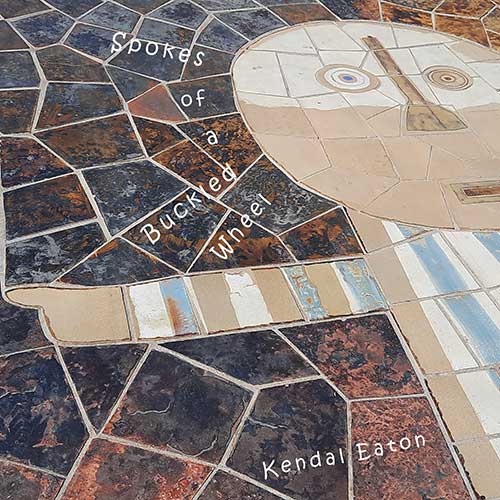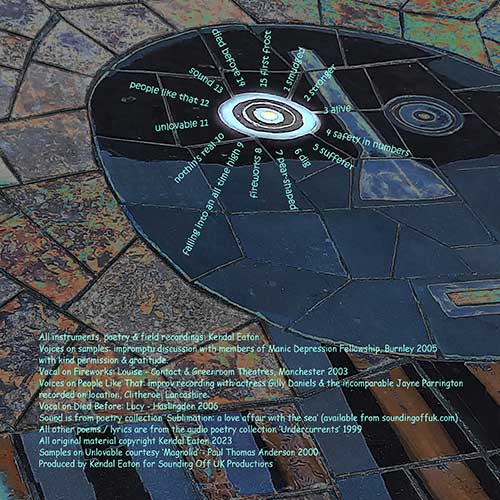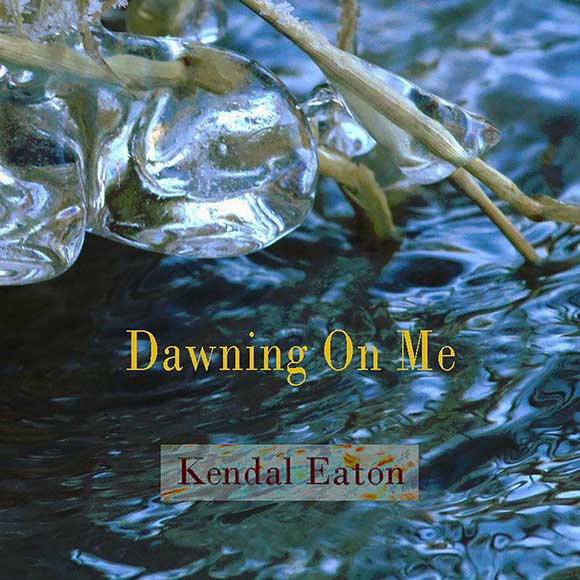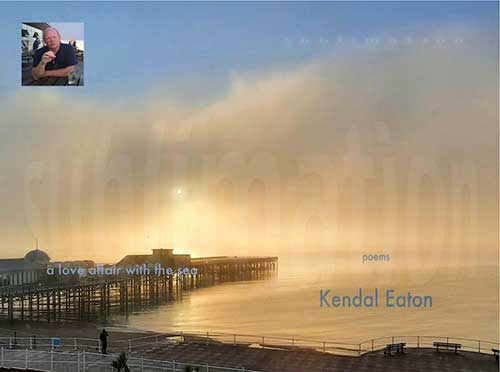‘Spokes Of A Buckled Wheel’ – New alternative solo album from Kendal Eaton
Why the title – ‘Spokes of a Buckled Wheel ‘?
It was a response to coming through the darkest times of personal mental anguish, following my complete breakdown in 1997. At that time mental health was still a taboo topic, especially amongst men. Stigma in services and amongst the public has somewhat eased with the passing time, but not much in practice. Middle-aged men are still the largest demographic amongst suicides and this doesn’t even touch the mental anguish that leads up to it. Men still don’t talk enough about the causes. I was lucky to work in mental health advocacy, support and NHS training, alongside heads of departments and other phenomenal ‘sufferers’ (I hate the dehumanised term ‘service-user’). I discovered the causes and symptoms are common and do not discriminate. Everyone has something to share that is incredibly valuable to each other. I found logic even in psychotic behaviour and it convinced me that people’s “uncharacteristic reactions” are actually very reasonable psychosomatic responses to extreme situations, often abusive. So, for me, most of these behaviours really aren’t mental ‘illness’; the symptoms are illness but the mind and body is digging the feet in the ground, telling a person that things have to stop and change urgently. That’s healthy no? If mental distress is non-discriminatory and the world is becoming increasingly taxing and insane, then every person is susceptible. Whether we’re regarded as successful or not, we all make up part of this wonky wheel.


What form does it take then?
The album incorporates samples from a discussion with members of Manic Depression Fellowship, Burnley in 2005. They kindly gave permission for me to record a session I hosted on the fly; an unplanned two-hour discussion on the topic “do you have to love yourself to be loved?” The conversation turned out to be non-preachy, incredibly poignant and often hilarious. Most people are very confident when they answer this question; you’re almost a heretic or treated as negative if you don’t follow the counselling and self-help book version, but I’d observed something that was different even to these contributors’ experiences. When doubting your own mentality, countless people and media are all too ready to make one up for you. So, it was a revelation to me and to these amazing and humble people, you may be pleasantly shocked.
When did the idea for the album come to you?
I’d been an emerging musician in the late 70s early 80’s, was offered a recording contract but got diverted with family matters. I went in the studio between 1998 and 2007 recording various bits. It’s taken twenty three years to get around to finishing it. Illness, relocating, writing 4 books, producing and releasing 7 music albums and other musicians, arts / theatre installations and commissions, voluntary work, all diverted me. I’m so pleased I kept hold of the takes and revisited it after all this time, since my music tastes and production qualities have matured and I could give it a more subtle treatment.
What are its musical influences?
I was sonically influenced by Bjork, Massive Attack and Portishead when I started, for me Bjork and Portishead had the courage to expose something honest and raw – I adore the vulnerability of Beth Gibbons’ vocals, also on ‘Out of Season’ with Rustin Man (also, Colour of Spring by Talk Talk is still one of my favourite most sonically sumptuous records) – and Massive Attack’s menacing moods, Robert Fripp’s oblique angular slant on music and the sensuosity of Eno and Hassell’s ‘Fourth World Vol 1: Possible Music.’ I went for dramatic sounds. I never use generic untreated sounds from instruments, unless acoustic or percussive, but even most of those are given my edge. I wanted extreme frequencies – sub bass, ambient and harmonic distortion and feedback – to trigger physiological and environmental responses, either to comfort or disturb or unsettle. So for example, on ‘Nothin’s Real’ I treated the kick with an expanding post-sub rumble that should vibrate walls even on small speakers, it has been attenuated since the original; on ‘Unlovable’ there’s what sounds like distorted guitar or modulated synth that gets to the verge of screaming desperation; on ‘Died Before’ there’s a filtered kick again but this time like the sound of bubbles rising in water, to make the listener feel cocooned; similarly, on ‘Sound’ I treated a synth to sound like waves crashing on rocks underwater with the swell sucking the current back from shore; and on ‘Falling Into An All-time High’ the vocal is treated at the end to give the impression of flying. Much later I was impacted by the whole oeuvre of Scott Walker.
So, along with the vocals and poetry, there’s a lot of spoken word, what made you choose this approach?
Human speech is another form of musicality. Mixing vocal conversations with music contributes a tonal melody, like a soloist or duo throwing in their own rhythmic jazz licks and hits with sometimes the sweetest and astonishing coincidences. You hear this on ‘People Like That’ where I basically gave two friends – Gilly Daniels, a seasoned actress and her close friend Jayne Parrington (non-actor) – a secret brief each and just that they were going to play mother and daughter. We assembled at Jayne’s mother’s home and just pressed record. I could never have anticipated the subtleties of what emerged and their improv performances still stagger me after hundreds of listens over the years. It has pathos, depth, conflict and humour, but the way it interacts with the solo bass loops is like a composed symphony to me.
Where did the poetic content originate?
I now regard my breakdown as a breakthrough. It woke me up to reconstructing my life honestly, instead of basing it on everything that had configured it to that point, including extreme levels of abuse. Part of that process was just writing things down for myself – just what I felt – because if something happened to me, I wanted there to be some indicator of the horror. That led to me putting somewhat abstract poems together and became part of my waking from a previous fortnight of catatonic state, unsupervised and alone. It was years of process but enabled me to get to know myself honestly and brutally.
Later I joined Manchester Survivors’ Poetry Group and Monday Night Critique group at Commonword publishers. I started reciting at poetry events and on my first appearance, I had good responses and the host, Chloe Poems, said they were powerful. I later became a regular performer at theatres and festivals across all the northwest counties mixing with great writers, Chloe (Gerry Potter), Lemn Sissay, Mike Garry (and his Gorton girls), Pam Leeson, James Quinn, Attila The Stockbroker, Jim Bennett and The Dead Good Poets Society, Liverpool, to mention a few, and did workshops with Carol Ann Duffy and some seasoned screenwriters and playwrights, getting some good feedback and confidence. I edited a couple of published academic books and helped with some BBC radio-plays written by close friends.
The poems come from that era spanning 1997 to 2007 – ‘Dawning On Me’ an anthology from ‘Listening to what, you don’t want to hear,’ ‘Undercurrents’ and ‘Fabulous Mornings’ which are mostly unadulterated true accounts. ‘Sound’ is from my latest collection: ‘Sublimation; a love affair with the sea’ – https://soundingoffuk.com/sublimation.html – I’ve included an audio-collection to accompany the album, available free to play or download.


What do you hope people will take away from the album?
Just an enjoyable sonic and thought-provoking journey; and without wanting to sound preachy, (I hate morals, they always predicate the stature of someone conceited, ascendant or judgmental, when we’re all subject to the same influences and environment), I’d hope some uncommon insight, inspiration to carry on, empathy, validation, to go easy on oneself and to remove this Dickensian notion that people behaving against expected norms who were previously predictable are suddenly ill, shifting the focus from where the problems usually lie. That we need to take life’s horrors seriously, but celebrate how people emerge from them and stop stigmatising those that don’t. People assume these topics are morbid, but that’s never been my experience in my exchanges with every individual I encounter. They have predominantly been inspiring and far more positive than most of the people and the stigma that surround them.
(Album Cover: photograph of a pavement on the promenade of Benalmadena, at playa Malapesquera. Poetry anthology cover: icicles from a frozen stream at Calf Hey reservoir, Haslingden).___
Track samples video
https://www.youtube.com/watch?v=MhRg_Bzj0hc
Track ‘Died Before’
https://www.youtube.com/watch?v=NUP9ZeBOht4
“…a tremendous achievement. I’m Stuck for superlatives. Wonderful production with such subtle touches. You’re the South Coast Scott Walker.” Keith Rodway (Column258 / Necessary Animals)
“Great album Kendal, tales of journeys and breakthroughs in a fine Mancunian basso profundo… heart-warming stuff.” Anthony Moore (Slapp Happy / Henry Cow)
Listen to all tracks, read details and lyrics, or download on Bandcamp –https://soundingoffuk.bandcamp.com/
Or Sounding Off UK – https://soundingoffuk.com/kendal.html
Or discounted downloads DIRECT FROM THE ARTIST – https://kendal.gumroad.com/
